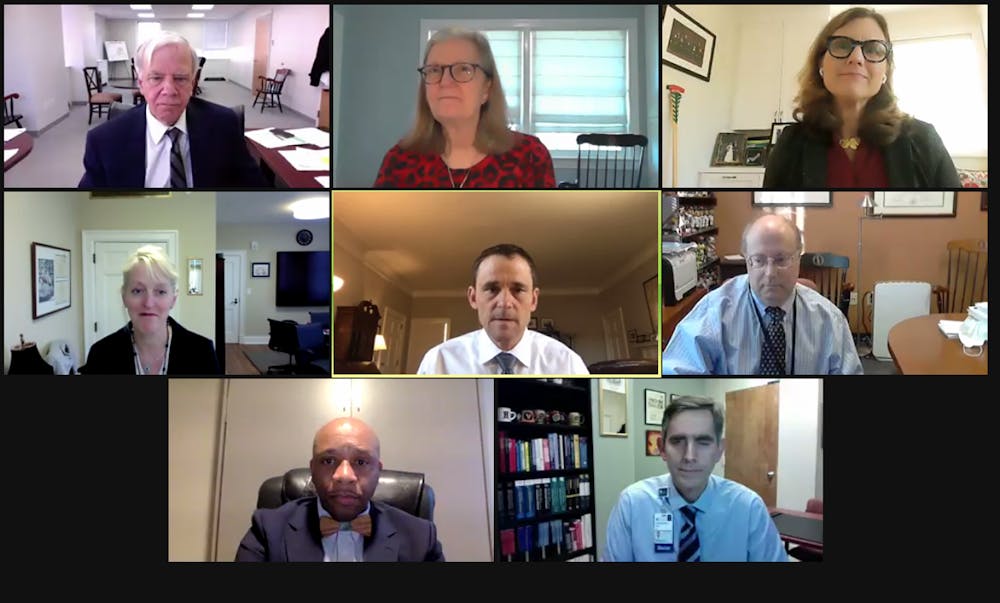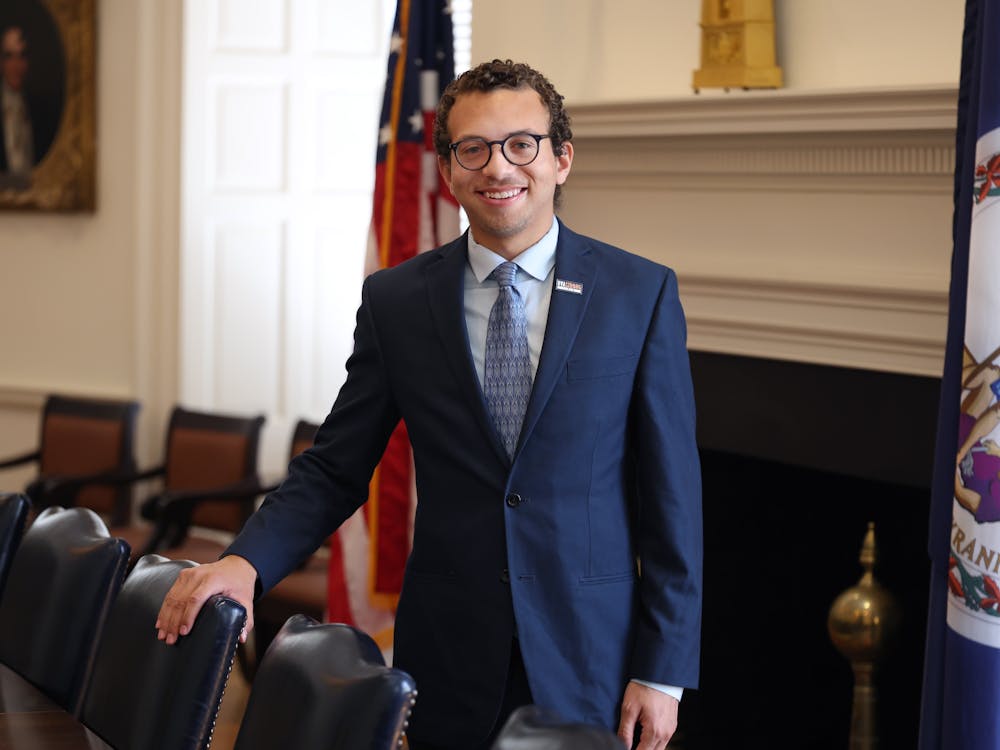University President Jim Ryan hosted a virtual town hall meeting with other University leaders and public health experts Thursday to discuss the upcoming semester. University health experts presented COVID-19 case trends and plans for testing and vaccinations. This was followed by a question-and-answer session with University leadership.
To begin the webinar, Ryan gave a brief recap of the fall semester, noting that the University will carry the lessons learned from the fall into the spring. In his opinion, the fall semester went well in terms of achieving the University’s basic goal of delivering on its mission of teaching, research and medical care while protecting the safety of students, faculty, staff and members of the Charlottesville community.
“It wasn’t perfect, and there were bumps along the way,” Ryan said. “But I believe the semester went better than many had expected.”
Ryan credited much of the fall semester’s success to the University’s increase in COVID-19 testing capacity, which increased from 350 tests per day to 1,000 tests per day by the end of the semester.
Ryan added that the capacity for saliva-based screening has now reached 5,000 tests per day. This capacity will allow the University to conduct weekly prevalence testing for all students living in the Charlottesville-Albemarle area in the spring.
The decision to allow students to return to Grounds for in-person instruction this spring was not made lightly, Ryan said. However, the University feels ready to welcome students back for in-person classes starting Monday due to testing, isolation space, hospital capacity and because off-Grounds students would likely return to Charlottesville regardless of whether or not classes were entirely online. Ryan said University health system leaders — including Dr. Craig Kent, executive vice president for Health Affairs — are confident about their hospital capacity.
“Our hospital is quite busy right now, but that is primarily due to non-COVID patients,” Ryan said. “We have plenty of capacity to treat COVID patients.”
U.Va Health recently experienced a surge in the number COVID-19 hospitalizations, which is expected to continue to increase over the next several weeks. Staff were required to pick up extra shifts beginning Jan. 10, and as of Thursday, there were 58 individuals hospitalized for COVID-19 at U.Va. Health.
Kent discussed the hospital’s ability to handle another potential increase in COVID-19 patients. Kent said there are detailed plans in place to decrease care for non-COVID-19 patients, such as delaying elective surgeries, as more beds are needed for those with the virus.
He also applauded the efforts of healthcare workers who are on the frontline of this crisis while also caring for non-COVID-19 patients, despite feelings of burnout throughout the hospital.
“I don’t think there is anybody in this world that is not a little tired right now of this crisis and hasn’t been affected by it,” Kent said. “We’re doing this as a team and we’re doing it because we care about people.”
Ryan acknowledged that many people have questions about the timeline for vaccine distribution. The University is partnering with the Blue Ridge Health District to speed up the process, and its goal is to help administer as many doses as possible. However, it is unknown how long the process will take. Through this partnership with BRHD, U.Va. Health is able to administer vaccines to members of the community over the age of 75 in addition to U.Va. Health employees.
Mitch Rosner — Henry Mulholland Professor of Medicine and chair of the Department of Medicine — discussed the guarded optimism the University has going into the spring semester.
According to Rosner, while daily case rates and deaths continue to rise in Virginia, there may be a plateau in new cases. Charlottesville and Albemarle County are still a bubble in the Commonwealth with lower case rates and lower viral positivity rates compared to the rest of the state.
The BRHD reports a seven-day percent positivity rate of 5.1 percent and a seven-day moving average of 45.1 cases per day while the Virginia Department of Health has a seven-day percent positivity rate of 12.2 percent and a seven-day moving average of 3,664 cases per day.
Last week, University viral testing showed 101 positive tests out of 11,209 tests administered overall. The student positivity rate has been less than 1 percent while the faculty and staff positivity rate has been 3.3 percent. Due to these numbers, Rosner believes the University is starting the semester in a fairly good place.
“We’re seeing really reasonable numbers of case rates that are manageable,” Rosner said.
The emergence of new variants of COVID-19 remains a concern. The variant first detected in the United Kingdom –– which has an unusually large number of mutations and a 50 percent greater transmissibility rate –– is now in the United States, with at least one documented case in Virginia. Rosner said public health officials are continuing to monitor the situation closely, but vigilance remains critical.
Director of Hospital Epidemiology Costi Sifri emphasized the ongoing partnership with BRHD to allocate vaccinations. The district’s vaccine distribution programs have been focused on community members over the age of 75 thus far, with over 20,000 vaccines provided as of Jan. 28. Sifri is still unsure of when the vaccine will be made available to more members of the University.
“We could anticipate this is going to be a process that we will need some patience to see to its end, and in the meantime we need to also continue to practice the public health and safety measures that we’ve been practicing here to date,” Sifri said.
The determination of when vaccines will become available to more University members is dependent upon the amount of vaccines allocated to BRHD by the Virginia Department of Health and the health district’s decision on how to roll out those vaccine doses.
Kevin McDonald, vice president for diversity, equity, inclusion and community partnerships for the University, is co-chairing a vaccine advisory group alongside Dr. Taison Bell of U.Va. Health to formulate how to more effectively communicate the importance of getting the vaccine. This group will work to identify the best strategies to recommend to University leadership and BRHD in an effort to get vaccination information out to the community.
However, the University cannot make the vaccine mandatory for students, faculty and staff. Ryan noted that both the Moderna and Pfizer vaccines are currently available under emergency use authorization, meaning taking the vaccine cannot legally be enforced. Costi added that it may not be appropriate to make vaccination mandatory at this time.
“I think that it’s probably not the right approach to take with the authorized vaccine that’s not licensed right now,” Costi said.
Mental health of students was a large concern for town hall participants. Pat Lampkin, vice president and chief student affairs officer for the University, said Counseling and Psychological Services has moved to telemedicine, and programs and infographics will be available to students to manage stress. University Provost Liz Magill noted the importance of getting students outside, adding that the addition of heating to the University’s outdoor tents and student leaders making efforts to continue organizing events will hopefully help to connect students this semester.
In response to the topic of mental health, Ryan said the University will continually evaluate restrictions on students, adapting them as the circumstances change. Restrictions will be tightened as necessary but loosened when feasible. The semester will begin with a two-week, six-person gathering limit — a decision advised by students who said that it is easier to meet in groups of six rather than five, Ryan said.
When asked if there could possibly be a shift to all or mostly in-person classes at some point in the semester, Magill said it will depend on the rollout of the vaccine and the course of the virus. Even if more in-person classes were to become available, there will still be a remote option for students who opted not to return to Grounds this spring.
According to Ryan, the importance of effective communication will play a large role in the upcoming semester.
“This remains a work-in-progress, but we remain committed to doing all we can to ensure that you have the information that you need,” Ryan said.
According to the University’s COVID-19 tracker, as of Friday, there have been 1,968 total COVID-19 cases amongst students, faculty, staff and contract employees, 153 of which are active cases. The tracker reports 19 new cases Thursday and 58 current hospitalizations.







